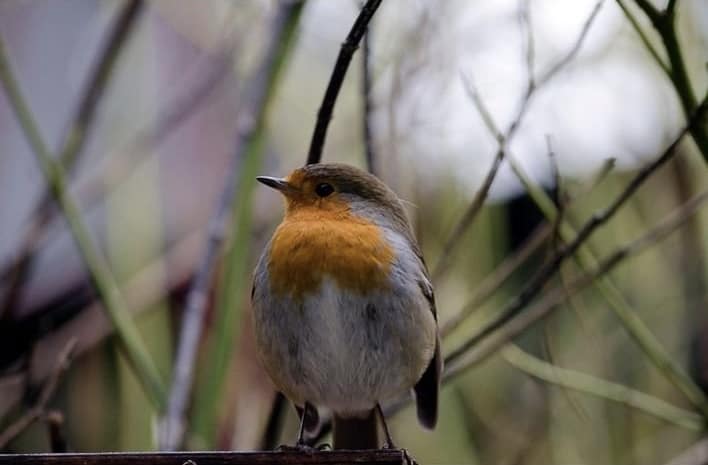Robins, or ‘Erithacus Rubecula’, are very common birds found in the UK and across Europe. They are usually up to 13cm long, and have a wingspan of 20cm. Most robins don’t live to see one year old, but those that live past that, live for five or six years, longer in captivity.
The apparent red chest and throat is the easiest way to identify a robin. The rest of their body is pale brown, and they have a black bill. A juvenile robin will have a more speckly appearance, and won’t develop their red chest until they are between three and four months old. This is because robins are very territorial birds, and so nestlings need to blend in and not stand out amongst other robins.
A robin’s main priority when choosing where to sleep is safety from predators, and warmth. They mainly like to sleep in bushes, hedge rows and trees, preferring to stay somewhat close to the ground yet still out of the reach of predators. Trees are a great option for an adult or juvenile robin, as the rustle of leaves gives away the presence of any lurking predator. They need to stay concealed from other birds that hunt them, such as crows, owls, hawks and blue jays. They also need to be out of reach of their predators that hunt on the ground, such as cats, dogs and foxes.
In addition to bushes, hedge banks and trees, an adult or juvenile robin can be found sleeping in log piles, wellies, sheds and even under car bonnets. They also appreciate the security and warmth that nesting boxes and hanging baskets provide. Here, they can stay warm and hidden under a roof canopy.
Robins don’t sleep in the same place every night; however, they aren’t likely to wander far from where they have been during the day. They are unlikely to choose a spot they are completely unfamiliar with, and may remain in the same spot for a few days but generally no more than this.
An adult or juvenile robin prefers to sleep near their food source, which may vary from day to day. They do this so that they are always near a meal if they need one.
In addition to this, since robins are territorial birds, sleeping in roughly the same area helps them ward off other robins that get too close. However, they don’t sleep in the same spot each night, which works as a deterrent for other predators to stay away.
Robins are diurnal birds, meaning that they are active during daylight hours and sleep during the night. This means that the daytime is typically for feeding and, during the spring and summer months, for mating. You may often hear an adult or juvenile robin singing during the day. Occasionally, birds such as robins may nap during the day if they feel very secure in their sleeping spot, but this is often not the case.
Robins sleep when they can’t do other important activities, such as feeding. It is a way of conserving and reviving energy during the night. Robins have poor night vision, so really the only thing they can do after the sun sets is sleep.
The number of hours a robin sleeps for depends on a few different factors such as their environment, the season, and the age of the robin. Research suggests that robins do not often need as much sleep as they get in countries like the UK, which has up to 16 hours of darkness per day in the winter. However, the inconvenience of the night time means they have nothing better to do!
The safety of an environment will have an impact on how many hours of sleep an adult or juvenile robin gets in any 24-hour period. Robins sleep lightly, allowing them to react to any predators that may lurk nearby. Many predators of robins, including cats and owls, tend to hunt at night, so it is vital that robins are able to sense when predators are nearby. If robins have free time and feel safe, they may also sleep during the day for short periods of time.
The hours of sleep that a robin gets depends greatly on the season. Robins typically sleep when it is dark, because they can’t feed or fly around during this time. Their inability to see in the dark means that this time is best spent resting.
This means that an adult or juvenile robin will typically sleep from 4.30pm until 8.30am in January in the UK, a total of 16 hours. In July, however, a robin would sleep from 9.30pm until 5.00am, giving them a total of 7.5 hours sleep.
Young robins, called ‘nestlings’ or ‘fledglings’, may sleep differently to adult robins. A nestling is a juvenile robin that is still in the nest full-time, and so these birds are likely to sleep whenever the parent robin is not feeding them.
A fledgling is a juvenile robin that has flown the nest, although they may still be reliant on their parents for food. These robins will be transitioning into a period where they will sleep during the night and will practice gathering food and flying during the daylight.

